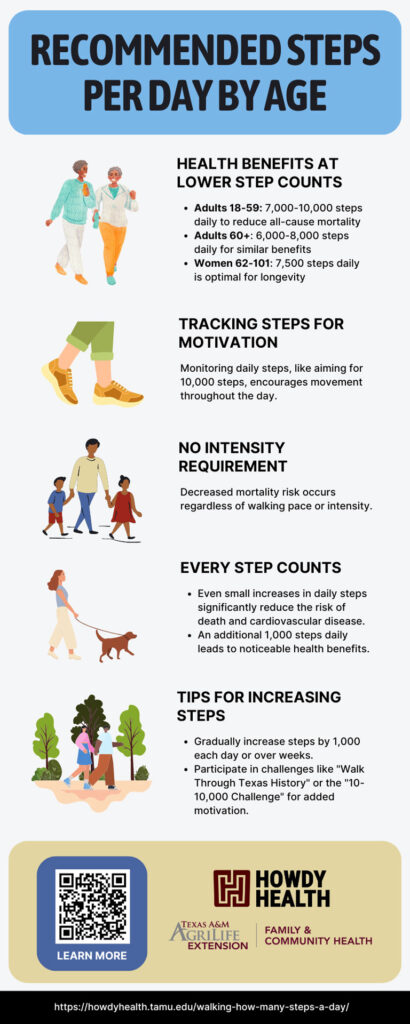Tracking how many steps we walk each can be a great motivator. Having a number, like 10,000 steps a day can help us act on moving more throughout our day, and during intentional bouts of physical activity. Still, this number can sometimes seem daunting.
Let’s Look at the Research
Are there health benefits below 10,000 steps? Several studies suggest that with more steps per day, all-cause mortality risk (risk of death from any cause) progressively decreases before leveling off at:
- 7,000-10,000 steps per day for adults aged 18-59 years1,2
- 6,000-8,000 steps per day for adults aged 60+ years1
- 7,500 steps per day for women aged 62-101 years.3
Though there is some variability between studies, there is a good amount of consistency to indicate that there may be a “sweet spot” for longevity somewhere between 6,000 – 10,000 steps depending on your age. And, interestingly, there was no significant association between step intensity and mortality, meaning that the decrease in risk of premature death was seen regardless of walking intensity (pace).
So, what if you don’t meet that step count? What if you’re starting a walking program? The science confirms that every bit counts and even small increases benefit your health.
A review of 17 studies among adults 18 years and older found that for each 1,000 step increase a day from baseline, there was a notable risk reduction in all-cause mortality as well as cardiovascular disease morbidity and mortality.4
Take More Steps During the Day
Try taking 1,000 more steps a day (or over the course of a few weeks) to add life to your years and years to your life! Keep adding a little more at a time – whatever your step goal – to benefit your health and longevity.
Need some motivation? Join Walk Through Texas History or the 10-10,000 Challenge to motivate you toward more steps each day.
Infographic
Download the PDF or share the image below to help others learn more about the recommended steps per day by age.
- Paluch AE, Bajpai S, Bassett DR, Carnethon MR, Ekelund U, Evenson KR, Galuska DA, Jefferis BJ, Kraus WE, Lee IM, Matthews CE, Omura JD, Patel AV, Pieper CF, Rees-Punia E, Dallmeier D, Klenk J, Whincup PH, Dooley EE, Gabriel KP, Palta P, Pompeii LA, Chernofsky A, Larson MG, Vasan RS, Spartano N, Ballin M, Nordström P, Nordström A, Anderssen SA, Bjørge, Hansen BH, Cochrane JA, Dwyer T, Wang J, Ferrucci L, Liu F, Schrack J, Urbanek J, Saint-Maurice PF, Yamamoto N, Yoshitake Y, Newton RL, Yang S, Shiroma EJ, Fulton JE. Daily steps and all-cause mortality: a meta-analysis of 15 international cohorts. The Lancet Public Health, 2022; 7 (3): e219 DOI: 10.1016/S2468-2667(21)00302-9
- Paluch AE, Gabrieal KP, Fulton JE, Lewis CE, Schreiner PJ, Sternfeld B, Sidney S, Siddique J, Whitaker KM, Carnethon MR. Steps per day and all-cause mortality in middle-aged adults in the coronary artery risk development in young adults study. JAMA Network Open 2021; 4: e2124516. DOI: 10:1001/jamanetworkopen.2021.24516
- Lee IM, Shiroma EJ, Kamada M, Bassett DR, Matthews CE, Buring JE. Association of step volume and intensity with all-cause mortality in older women. JAMA Intern Med 2019: 179: 1105-12.
- Hall KS, Hyde ET, Bassett DR, Carlson SA, Carnethon MR, Ekelund U, Evenson KR, Galuska DA, Kraus WE, Lee IM, Matthews CE, Omura JD, Paluch AE, Thomas WI, Fulton JE. Systematic review to the prospective association of daily step counts with risk of mortality, cardiovascular disease, and dysglycemia. Int J Behav Nutr Phys Act 2020: 17:78.





